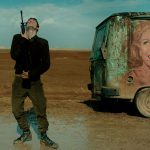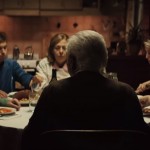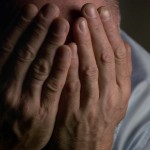There have been several documentaries about Palestinians, uprooted and marginalised when Israel became a country in 1948, turning to violence and suicide bombing or struggling to live and work among the check points and restrictive borders with Israel. But for the thousands of people living in limbo in distant refugee camps, life is both better and worse. Until A World Not Ours, however, no one has admitted to spending enjoyable summer holidays in a refugee camp.
Palestinian Writer/Director Mahdi Fleifel takes us back to Ain El Helweh in Lebanon to recapture his childhood memories growing up there, and check up three generations of men he left behind. If this exploration allows him to reassess those memories when seen through a more objective lens, it is an even bigger eye opener for us.
Mahdi was born in Dubai and raised in the Ain El-Helweh refugee camp before moving with his family to Elsinore, Denmark. In Denmark they tried to integrate with the local population and get used to the cold, but eventually his parents divorced under the strain. Every summer, however, Mahdi’s mother would take the children to visit their grandparents and relatives at the camp. Mahdi remembers that every four years, a cousin’s sport’s shop became the focus for the entire male population during the world cup games, when residents of the camp took sides, pretending to be either Brazilians, German or Italian. He remembers having more fun than he ever had in Denmark.
Unlike his friends from the camp, Mahdi was able to study at Britain’s National Film and Television School, (he graduated in 2009) and live in London. Combining home movies taken by his camera-addicted father and filmed interviews with family and friends who still live in the camp, Mahdi’s portrait is less political, and more humanitarian in focus that you would expect. The film focuses on Mahdi’s grandfather Abu Osama, his Uncle Said and former best friend Abu Iyad.
Although Abu Osama’s late wife wanted to follow her children to Denmark, he refused, partly, Mahdi feels, for fear that he would be closing the door to a return to Palestine and abandoning his roots. Middle-aged Uncle Said collects aluminium from the streets and is too poor to marry. Although considered by some to be the village idiot, we learn that Said was a hero of the civil war in the 1980s, but died a little with the death of his brother, Jamal.
The most complex and interesting, interviewee is Mahdi’s boyhood friend, Abu Iyad. A member of the PLO’s Fatah group since childhood, Abu has dedicated his life to ‘the cause’. When Mahdi meets up with him, he has become disillusioned with the PLO to the point of questioning the point of the revolution and the dream of a return to Palestine. Tired of his futile life in the camp, we see him make the move to a new life. After a couple of years living hand-to-mouth abroad, notably in Athens, however, he is deported back to the camp.
Whatever your politics, you cannot help but feel for these people living a basic existence in a country that is not there own, and where they are not particularly welcome. A World Not Ours is an important addition to the body of films on the Palestinian question, but also a fascinating glimpse of the devastating long term consequences of wars and border changes. With the huge refugee population from the more recent Syrian civil war, A World Not Ours is all the more timely.




